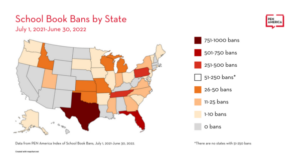As politics continue to creep into each and every corner of our nation’s public schools, it’s important to evaluate and reflect on the depth of its intrusion.
Political interference has heavily impacted teachers, and now they’re saying enough is enough. The Texas Teachers Association, for example, reported a record number of employees (70%) who admit they’re seriously considering abandoning the profession in August.
American Federation of Teachers President Randi Weingarten attributed teacher dissatisfaction to a lack of respect and resources.
“Teachers and school staff have been struggling for years with a lack of professional respect, inadequate support and resources, subpar compensation, untenable student loan debt, endless paperwork, and a culture of blame that weaponizes standardized tests to attack public schools and public school teachers,” she said a statement.
Political actors
Who else is standing on the frontlines of what has been labeled “political” and “cultural warfare” in our nation’s schools: librarians.
According to the latest report from the anti-censorship organization PEN America, there have been 2,532 instances of individual books being banned during the 2021-22 school year, leading to 1,648 unique book titles facing censorship.
Additionally, at least 50 political advocacy groups are the driving force contributing to this recent uptick in banned books. Among these groups, the most prominent are:
- Moms for Liberty
- US Parents Involved in Education
- No Left Turn in Education
- MassResistance
- Parents’ Rights in Education
- Mary in the Library
- County Citizens Defending Freedom USA
- Power2Parent
“While we think of book bans as the work of individual concerned citizens, our report demonstrates that today’s wave of bans represents a coordinated campaign to banish books being waged by sophisticated, ideological and well-resourced advocacy organizations,” said Chief Executive Officer of PEN America Suzanne Nossel in a statement.
These groups, according to the report, are “linked directly” to at least 20% of the bans that were implemented during the 2021-22 school year. Additionally, these groups commonly operate to promote Christian values.
More from DA: 17 Senate Republics say mask requirements are ‘unnecessary’ in Head Start programs
“Some of the groups espouse Christian nationalist political views, while many have mission statements oriented toward reforming public schools, in some cases to offer more religious education,” the report reads.
States enacting book bans
In addition to revealing an uptick in censorship among libraries, the report also identified which states have enacted the most book bans. According to the data (see below), Texas far exceeds any other state.

Republican state representative Matt Krause issued a letter to school districts and a list of 850 book titles asking them to report on which books their libraries currently held. In the letter, Krause asks districts to report any books that address or contain the following topics:
“human sexuality, sexually transmitted diseases, or human immunodeficiency virus (HIV) or acquired immune deficiency syndrome (AIDS), sexually explicit images, graphic presentations of sexual behavior that is in violation of the law, or contain material that might make students feel discomfort, guilt, anguish, or any other form of psychological distress because of their race or sex or convey that a student, by virtue of their race or sex, is inherently racist, sexist, or oppressive, whether consciously or unconsciously.”
Topics facing censorship
Among the 1,648 unique book titles that were banned, 674 (41%) address LGBTQ+ themes or include LGBTQ+ characters. Additionally, 659 titles (40%) include protagonists or secondary characters of color. 338 titles (21%) discuss the issue of race and racism.
These are the most frequently banned books among districts, according to the report:
- “Gender Queer: A Memoir” by Maia Kobabe (41 districts)
- “All Boys Aren’t Blue” by George M. Johnson (29 districts)
- “Out of Darkness” by Ashley Hope Pérez (24 districts)
“This rapidly accelerating movement has resulted in more and more students losing access to literature that equips them to meet the challenges and complexities of democratic citizenship,” said Jonathan Friedman, director of PEN America’s Free Expression and Education Programs and lead author of the report in a statement.
“The work of groups organizing and advocating to ban books in schools is especially harmful to students from historically marginalized backgrounds, who are forced to experience stories that validate their lives vanishing from classrooms and library shelves.”



